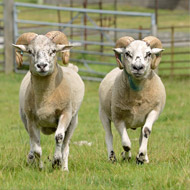New insights 'could boost sheep health and productivity’

Researchers hope their findings could eventually aid breeding programmes aimed at improving sheep health and productivity.
New research into the genetic code of sheep could help farmers breed healthier animals, according to the University of Edinburgh.
The study, published in the journal PLOS Genetics, maps out which genes are switched on and off in the different organs and tissues in a sheep’s body.
Researchers hope their findings could eventually aid breeding programmes aimed at improving sheep health and productivity.
The results are now published in an online database, which is free to access by scientists anywhere in the world. The team anticipates this resource will help further understanding of the sheep’s genetic make-up.
“This is the largest resource of its kind. The ongoing comparative analysis will provide insights to help us understand gene function across all large animal species, including humans,” commented Professor David Hume, of the University of Edinburgh’s Roslin Institute.
Dr Emily Clark, who coordinated the project, added: “Sheep are a central part of the rural economy in the UK and are essential to sustainable agriculture across the globe.
“The new resource represents a major step towards understanding how the sheep’s genetic information influences its physical traits and provides a foundation to use this information to generate sustainable improvements in the productivity of livestock animals.”
In the study, researchers focused on a genetic material called RNA. RNA is produced as an intermediate step when DNA code is translated into the proteins and molecules that make up cells and tissues.
By analysing the total RNA produced in each tissue of the sheep’s body, the researchers were able to ascertain which genes are expressed in which tissues at any one time.
The study is a major step towards understanding how the sheep’s genetic information influences its physical traits. Researchers say the findings also shed new light on the function of hundreds of genes whose role was not previously unknown.



 The Animal and Plant Health Agency (APHA) has updated its online reporting service for dead wild birds.
The Animal and Plant Health Agency (APHA) has updated its online reporting service for dead wild birds.